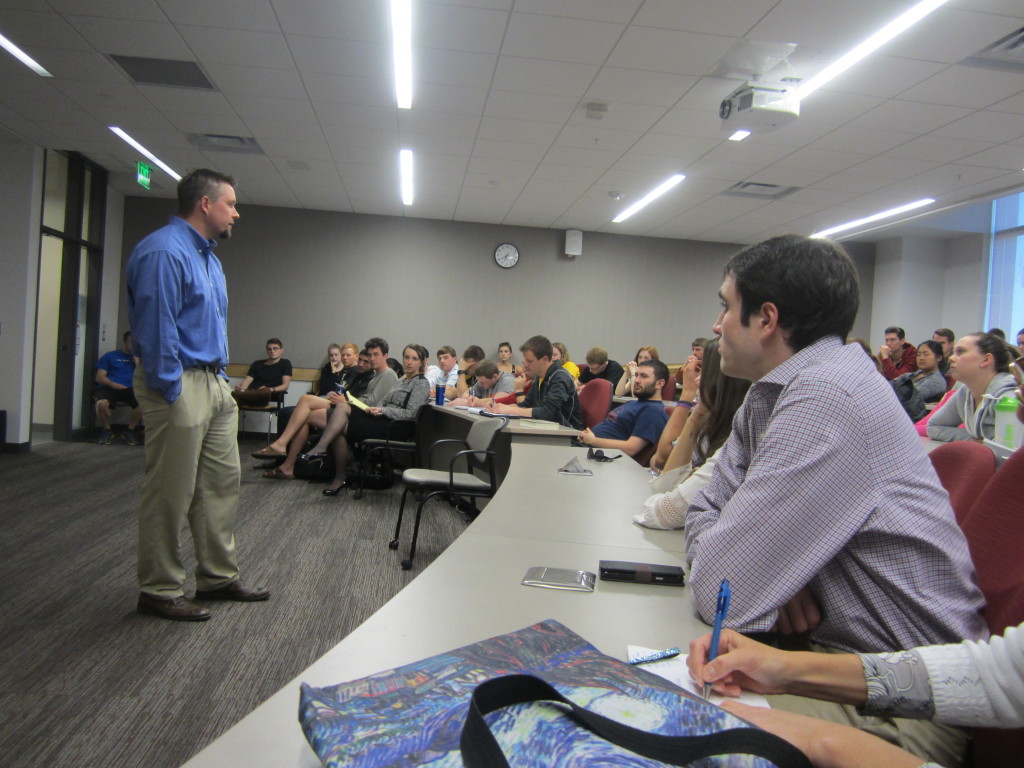In my role as a business ethicist engaged in getting as many conversations going about ethics as possible, having a speaker like we had Monday night is the best possible scenario. Nathan Mueller began writing to me a couple of years ago while he was still incarcerated in federal prison in Duluth, wanting to come back to Gustavus and talk to students about his experiences in the hopes that you will not make the same decisions he did. Students packed Beck 101 to listen and reflect on what he said, and that was a lot: Nathan was amazingly open to sharing very difficult aspects of himself, having spent many years considering his path and the decisions he made, and why. Laura Bowyer and the Accounting Club made the arrangements to get Nathan to campus, where we had a great group of students and faculty for dinner before the larger group.
Nathan is a 1996 Gustie with a degree in Accounting. After he earned his degree, he worked in public accounting for several years. His next professional step was to work in insurance. Nathan first joined Reliastar, which became ING after an acquisition. During the ING transition, Nathan discovered a hole in the financial control systems in which he had expertise. Specifically, he happened upon a spreadsheet that listed his name, along with the number $250,000 – his check-authorization limit. No one was more surprised than Nathan to discover his erroneous check-writing authority! This systemic mistake ultimately allowed him to embezzle $8.5 million and, once he was caught, caused him to spend 5 ½ years in federal prison.
Nathan’s is a story about the slippery slope of unethical behavior, and it’s also a story about an ordinary person like you and me who made choices that have negatively affected his and his family’s lives. He is certainly not the first or only person to have perpetrated this kind of fraud: the accounting industry has defined the foundations for Nathan’s behavior, called the Fraud Triangle: Opportunity, Rationalization, and Pressure. Nathan’s story is the Fraud Triangle in action and I found maybe the most interesting piece of the triangle he talked about to be the Pressure “side.” His pressure, he says, was almost completely self-generated in his obsession with wanting to appear happy and successful. The great irony is how desperately unhappy he became in that quest for a particular appearance of success that was unmoored from any values or even reality.
The question from students I really wanted to hear (and I almost asked one sitting next to me to ask it) was, “What are the top 3 things you want students to know about your experience that you think could help them the most in avoiding the path you have taken?” but we ran out of time. In a follow up email, however, Nathan provided the answers to that question and here is what he said:
- Self-awareness is really important. I recognized the issues I had, but I never made the effort to fix them. Things got worse and worse and literally ruined my personal life as well as my professional life.
- Identify your core values and be very deliberate about sticking to them in your career. Identify the lines you are not willing to cross so you make the right decision when you are faced with those choices. It is not one choice that causes a situation like mine. It is many small decisions that lead you down a path you might not think was possible.
- You need to surround yourself with the right people. You should be able to go to your network for advice in making decisions and help if and when you make the wrong decision. You need people in your life who will both support you and hold you accountable.
I would also add that when I asked him that question, he wanted to reflect a bit on it before responding, which is itself a skill set in helping make the right decisions. With the level of candor he used in responding to my and students’ questions, it is clear that Nathan is now expert at reflection work and doesn’t hide anything from himself. If only all organizational leaders could have that ability!
When I introduced Nathan, I asked students to try to suspend their belief that it could never be them, that they would never make those same choices. Very few people (well, except for the guys at Enron) enter organizations intent on fraudulent behavior. As students begin their organizational journeys, it is Nathan’s sincere hope that students remember his lessons and make different decisions—learn from his willingness to share.


Leave a Reply
You must be logged in to post a comment.